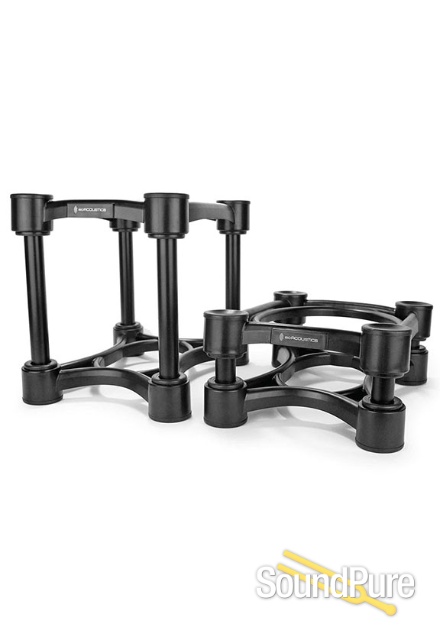-
Call Us Toll Free888-528-9703
-
Local/International (+1)919-682-5552
- Call Us! Toll Free! 888-528-9703
- Local / International (+1) 919-682-5552

IsoAcoustics ISO-200 Isolation Stands From IsoAcoustics
For large speakers and studio monitors Fine tune your sound the way it’s meant to be heard
$169.99
"Experience the Difference"
 Payments as low as $14/mo.
Payments as low as $14/mo.
Manufacturer's Description from IsoAcoustics
The ISO-200 isolation stand is 7.8” (200mm) wide x 10” (255mm) depth and is rated for monitors weighing up to 60lbs. The ISO Stands are the latest generation of IsoAcoustics stands designed for studio monitors. The ISO Stands are an updated version of the popular ISO-L8R series and features a lower profile, new frame design and a newer version of isolator for improved performance.
Offering 14 variations of height and tilt, the ISO-200 will help you optimize the placement of your monitors and bring your tweeters to ear level. The IsoAcoustics patented isolation system provides superior isolation and decoupling from the supporting surface. The stands are biased to keep all energy in alignment with the speaker cones, providing greater clarity and focus.
Perfect for optimizing the placement and performance of small studio monitors…
An important aspect of the speaker stand design is the ability to adjust the height and tilt angle of the supported speaker enclosure to optimize its position relative to the listener and eliminate soundwave reflections off the supporting surface. In a typical Desktop Audio Workstation (DAW) configuration, the listener is positioned 3 to 4 feet from the monitors with ear level approximately 20″ above the work surface. Raising and tilting the monitors to the optimum position can be achieved in these circumstances using the IsoAcoustics stands.
Patented IsoAcoustics Isolation
Exciting the supporting surface
The isolators manage the energy of the speaker to reduce vibrations resonating through the supporting surface to eliminate dissonant sounds in the listening area or joining rooms.
Reducing internal reflections
Internal reflections are vibrations reflecting back up the speaker cabinet which causes smear. Smear is a result of artifacts replicated in both channels which are perceived to be in the middle, causing the stereo image to collapse. The IsoAcoustics isolators reduce internal reflections to eliminate smear. The result is an improved stereo image of natural spatial sound.
Specifications
















